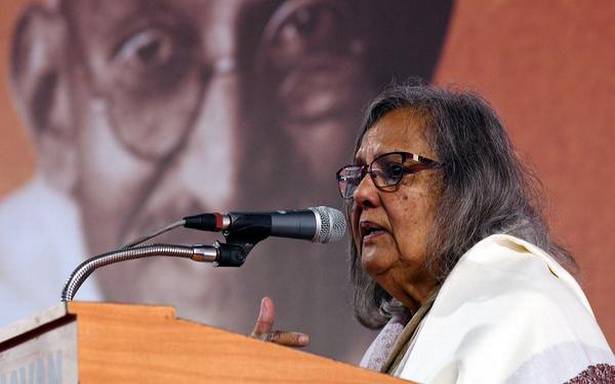“We will all be South Africa citizens and recognised as such,” says the granddaughter of Mahatma Gandhi.
India should help South Africa in its efforts to rebuild the country after the recent violence it witnessed, Ela Gandhi, the granddaughter of Mahatma Gandhi, has said.
Speaking as a delegate from the Indian Consulate in Durban during an online seminar organised on the occasion of India’s 75th Independence day, Ms. Gandhi said that the recent violence in the Indian area of Phoenix, the massive Indian township north of Durban that caused tensions between the residents and the Blacks of three neighbouring informal settlements, was caused by a few perpetrators with criminal intent, who must be brought to book.
“But it doesn’t mean that an entire community or an entire area is racist and is the cause of these few digressions that occurred. As we are building peace, one good thing that has come out of all this is the unity amongst the people,” Ms. Gandhi said. “We are all getting together and working together and we are going to build peace in the country. I sincerely hope that the government of India and the people of India will once again help us to build this peace and to build common nation bonds in South Africa where we would not need to call people by different identities (by ethnic origins).
We will all be South Africa citizens and recognised as such,” Ms. Gandhi concluded.
Tensions followed by violence between the two communities in the township of Phoenix and surrounding areas were sparked by social media posts following the violence over the arrest of former President Jacob Zuma on July 7. During the August 15 event High Commissioner for India, Jaydeep Sarkar said the four Indian missions had collaborated on the topic of the contribution of the Indian Diaspora in the making of South Africa as equal citizens.
Mr. Sarkar made a plea for greater recording of the history of the community, which he said Indians in general tended to take for granted.
The diplomat shared a story about the late president Nelson Mandela and his role in reconciliation as he described a picture which he had seen at the Foundation that bears the iconic leader’s name.
“Alongside the pictures of Mandela with world leaders was a picture of him with an elderly sari-clad lady. I asked the Foundation who this lady was who had found a place in this famous galaxy of people.
“The director told me that the lady was Mrs G R Naidoo (whose husband) was a photographer at the time that Nelson Mandela was arrested at LIliesleaf Farm. At that time, many of his fellow activists had believed that it was G R Naidoo who had betrayed Nelson Mandela’s location. Mandela himself never believed that and one of the first things he did when he came out of prison was to call Naidoo’s widow and to honour her in this way,” Mr. Sarkar said.
The arrest of Mandela and others at the farm led to the infamous Rivonia Trial that sent them to Robben Island as political prisoners for decades.
In Mandela’s case, he was a prisoner for 27 years before becoming South Africa’s first democratically elected president.
Shanil Haricharan, who heads up the Nelson Mandela School of Public Governance in Cape Town, said India’s independence had been a turning point in the history of colonisation across the world.
Professor Dhiru Soni, Director of the Regent Business School, spoke about some of the achievements of the Indian community in the academic field despite the challenges of apartheid-era discrimination.
He also gave examples of how the Indian community had come to the assistance of fellow Black citizens on many occasions to fund their education.
The event concluded with dance and patriotic song items by both the expatriate and local Indian community, as well as a dance to the music of the renowned AR Rahman song ‘Jai Ho’ by a Black duo from Soweto.
Source: Read Full Article

